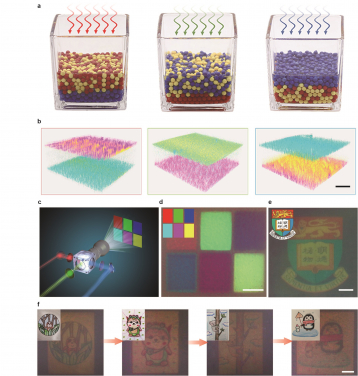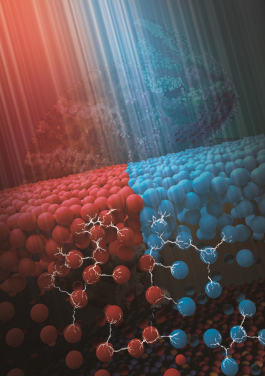Media
Physical Chemists Develop Photochromic Active Colloids
Shedding Light on the Development of New Smart Active Materials
18 May 2023

Three-dimensional phase segregation and photochromic colloidal swarm.
a, The Illustration of spectral sensitive layered segregation in the ternary colloidal system, where different illumination spectra resulted in distinctive vertical stratification.
b, The 3D distribution of ternary colloidal particles as imaged by confocal microscope after red, green, and blue light illumination. The SQ2, LEG4, and L0 sensitized TiO2 colloids are represented in cyan, magenta, and yellow, respectively. Scale bar: 50 mm. c, Modified projector is used to project designed colour images.
d, Six colour blocks emerged on the surface of photochromic ink after 2 min exposure. Inset: the projected pattern. Scale bar: 2 mm.
e, The university logo emerged on the surface of photochromic ink after 2 min exposure. Scale bar: 2 mm. f, Sequential patterning of the photochromic ink with different colour paintings with 2 min exposure. Inset: the original projected patterns. Scale bar: 2 mm.

Novel ink composed of colourful microbeads adapts to the appearance of received light by light-driven separation.

Three-dimensional phase segregation and photochromic colloidal swarm.
a, The Illustration of spectral sensitive layered segregation in the ternary colloidal system, where different illumination spectra resulted in distinctive vertical stratification.
b, The 3D distribution of ternary colloidal particles as imaged by confocal microscope after red, green, and blue light illumination. The SQ2, LEG4, and L0 sensitized TiO2 colloids are represented in cyan, magenta, and yellow, respectively. Scale bar: 50 mm. c, Modified projector is used to project designed colour images.
d, Six colour blocks emerged on the surface of photochromic ink after 2 min exposure. Inset: the projected pattern. Scale bar: 2 mm.
e, The university logo emerged on the surface of photochromic ink after 2 min exposure. Scale bar: 2 mm. f, Sequential patterning of the photochromic ink with different colour paintings with 2 min exposure. Inset: the original projected patterns. Scale bar: 2 mm.
- 1 / 2
- 2 / 2
In nature, the skin of cephalopods (animals with tentacles attached to the head) exhibits unparalleled camouflage ability. Their skin contains pigment groups that can sense changes in environmental light conditions and adjust their appearance through the action of pigment cells. Although intricate in nature, this colour-changing ability is fundamentally based on a mechanical mechanism in which pigment particles are folded or unfolded under the control of radial muscles.
Inspired by this natural process, a research team led by Dr Jinyao TANG from the Department of Chemistry at The University of Hong Kong (HKU), develops a novel wavelength-selective intelligent colloid system to achieve light-controlled multi-dimensional phase segregation in collaboration with scientists from Hong Kong University of Science and Technology and Xiamen University. The team forms dynamic photochromic nanoclusters by mixing cyan, magenta and yellow microbeads, achieving photochromism on a macro scale. This macroscopic photochromism relies on light-induced vertical phase stratification in the active microbeads mixture, resulting in the enrichment of coloured microbeads corresponding to the incident spectrum.
Unlike existing colour-changing materials, this new photochromic colloidal swarm relies on rearranging existing pigments rather than generating new chromophores in situ and is, therefore, more reliable and programmable. Their findings provide a simple method for applications such as electronic ink, displays, and active optical camouflage, representing a major breakthrough in the field of active matter. The research result is recently published in the prestigious academic journal Nature.
Self-actuated active particles are micro/nanoparticles that mimic the directional swimming of microorganisms in liquid. Recently, they have attracted significant attention in nanoscience and non-equilibrium physics and is being developed for potential biomedical applications. One of the main research objectives of active particles are to develop medical micro/nanorobots based on these particles for drug delivery and non-invasive surgery. However, the structure of active particles is very simple, and their driving mechanism and environment perception are significantly limited. In particular, the size and relatively simple structure of the individual micro/nano active particles restrict the complexity of implementing functions on their body. The challenge and key to realising the future application is how to make active particles with intelligent characteristics despite their simple structure.
Light-powered microswimmers, a type of self-actuated active particles, have been recently developed for the purpose of creating controllable nanorobot, which offers potential for biomedical application and functional novel materials as the swimmer activity, alignment direction, and interparticle interaction can be readily modulated with incident light. On the other hand, light not only induces photosensitive motion in microswimmers but also changes the effective interaction between particles. For example, photocatalytic reactions can change the local chemical gradient field, which in turn affects the movement trajectory of neighboring particles through diffusion swimming effect, resulting in long-range attraction or repulsion.
In this work, Tang’s team designed a simple wavelength-selective TiO2 active microbeads system based on their previous research on light-powered microswimmers. Upon photoexcitation, the redox reaction on TiO2 particles generates a chemical gradient, which tunes the effective particle-particle interaction. That is, the particle-particle interaction can be controlled by combining incident light of different wavelengths and intensities. TiO2 microbead with different photosensitive activities can be formed by selecting dye sensitisation codes with different spectral characteristics. By mixing several otherwise identical TiO2 microbeads species loaded with dyes of different absorption spectra and adjusting the incident light spectra, the on-demand particle segregation is realised.
The purpose of realising particle phase segregation is to control the particle aggregation and dispersion in liquid at both micro and macro levels. Effectively, this resulted in a novel photoresponsive ink by mixing microbeads with different photo-sensitivity that maybe applied to electronic paper. The principle is similar to the pigment clusters in the skin of cephalopods that can sense the light condition of the environment and change the appearance of surrounding pigment cells through their corresponding actions.
‘The research findings have contributed significantly to advancing our knowledge of swarm intelligence in artificial active materials and have paved the way for designing innovative active smart materials. With this breakthrough, we anticipate the development of programmable photochromic ink that could be utilised in various applications such as e-ink, display ink, and even active optical camouflage ink,’ Dr Jinyao Tang concluded.
Journal paper: ‘Photochromism from wavelength-selective colloidal phase segregation’ , Nature
Link: https://www.nature.com/articles/s41586-023-05873-4
View the research video: https://youtu.be/3Ylodxllwvo
Images download and captions: https://www.scifac.hku.hk/press
More information about Dr Jinyao Tang: https://tanglab.hku.hk
For media enquiries, please contact Ms Cindy Chan, Assistant Communications Director of Faculty of Science (Tel: 3917-5286; email: cindycst@hku.hk).
